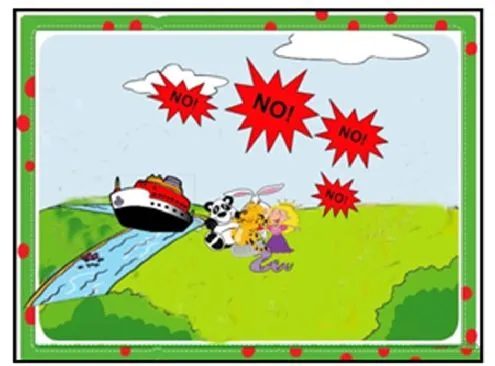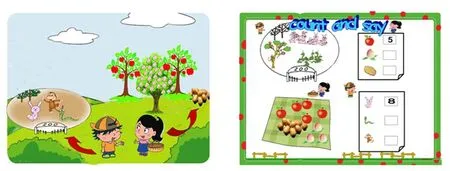北京版《英语》一(下)Unit 4 How many stars can you see?Lesson 16
2018-05-25赵立英
赵立英
教学过程
Step 1.Warm-up
1. 歌曲演唱“Count the apples”。
师生互相问好,并一起表演歌曲Count the apples:
Count the apples,one,two,three.
Count the apples,four,five,six.
Count the apples,seven,eight,nine,ten.
That’s all of them.
设计意图:通过歌曲演唱,复习本单元所学数字1-10,唤起学生对已学知识的记忆。学生边唱边通过手势表达数字,渗透中西方文化差异。
2. 韵文表演 P,Q,R,S,T。
教师依次播放本单元学习课Let’s say部分的韵文,学生边说边做动作。

设计意图:通过韵文表演,复习本单元前三个学习课Let’s say内容中出现的字母和词汇,同时体验字母在单词中的读音。
Step 2.Review the letters
1.复习本单元所学字母 Pp-Tt
教师通过热身环节的韵文表演,唤起学生对本单元所学字母的记忆,从而引出Pp,Qq,Rr,Ss,Tt,并适时纠正个别字母的读音。
2.复习前四单元所学字母Aa-Tt
教师通过课件呈现前四个单元所学的字母并引导学生大声朗读。
设计意图:复习学过的字母,再次强化个别字母的发音,如Gg,Jj,Ii等等。通过朗读以上字母,让学生感知26个字母表中字母的顺序。
3.Match and Say
(1)呈现情境
T:Look atYang yang and Lingling,they continue visiting the farm.Now,they are near a pond.
(教师通过课件呈现农场中小池塘的场景及小鸭子的叫声,引导学生观察图片并预测情境)
T:What can they see in the pond?What letters can you see?What’swrongwith thelittle ducks?Would you like to help the baby ducks to find their mother?
(2)小组活动
S1:Look! I am big letter R.
S2:I am small letter r.
S1&S2:We are family.
(课前,学生每人准备一张字母卡片,通过大小写字母配对,帮助小鸭子找到妈妈。)

设计意图:教师继续延伸本单元的情境主线“参观农场”,并将教材中的Match and say板块改编成小鸭子找妈妈的游戏。通过字母大小写配对,强调了字母的认读以及对字母形的辨认。
Step 3.Review the words
1.呈现情境。
T:Lingling and Yangyang come to the river.They want to cross it.Who do they see near the river?
(教师依次呈现本单元所学词汇的图片panda,queen,tiger,rabbit,snake,学生大声朗读。)
T:They want to cross the river,too.Listen!What happen with them?
(教师播放这些朋友吵架的声音:I want to be the No.1! No,I want to be the No.1! No!No!No!)
T:What will they do?They will listen to the order and then get on the ship one by one.
2.听录音排序。
(学生将手中的单词图片,根据所听内容的顺序排列。)

录音内容:
(1)Hello,everybody.Attention,please! No.1 is the panda.
(2)No.2 is the queen with a peach.
(3)Rabbit,rabbit! You are No.3.
(4)No.4 is the tiger with a tire.
(5)The last one is the snake.Snake,snake!It’s your turn.
OK,everybody.Have a nice trip!
设计意图:教师通过在河边遇见一些朋友要过河,但是他们为了能先登上轮船发生了争吵这样一段充满童趣的小情境,引导学生置身其中,在较为真实的情境中完成任务,并强化了单词的读音。同时通过排队上船这一行为,将教材中的听力活动趣味化,既复习了所学语言,又渗透了文明礼仪的教育。
Step 4.Review the structure
1.呈现情境。
T:Yangyang wants to seetheanimals and Lingling wants to pick up the fruits.How many rabbits can Yangyang see?How many apples does Lingling have?Let’s do a survey in pairs.
2.结对活动。
(学生两人一组,通过问答完成信息差表格的填写。)

活动语言:
S1:How many apples do you have?
S2:I have five.How many rabbits can you see?
S1:I can see eight rabbits.
S1:How many peaches...?
S2:...
设计意图:教师将教材中的Count and say改编成一个真实的Information gap活动,引导学生进行“How many...can you see?How many...do you have?”的复习巩固,突出了交流的真实性。
Step 5.Communication
1.呈现情境。
T:Our friends are very happy on the farm.Do you want to go there? Look! This is a pond.We can go fishing.There is a mini zoo.We can see many animals there.
(教师借助图片、展板道具创设农场场景:采摘区、钓鱼区及小小动物园。)

2.创编对话。
(学生在两人一组根据真实场景创编参观农场的小对话。)
S1:Hello,Mary.Let’s go to the farm.
S2:OK,let’s go!
S1:Look! There are so many animals.How many monkeys can you see?
S2:One,two,three...I can see ten monkeys.Do you like apples?
S1:Yes,I do.Let’s pick up the apples.
S2:How many apples do you have?
S1:Let me count.One,two,three,...I have five apples.
S2:Great!
3.展示评价。
设计意图:在Talk and act这个板块中,教师在教室里布置三个农场的区域场景,引导学生综合运用所学句型,把生活中比较常见和学生感兴趣的场景搬到课堂中来,这样学生的语言表达就有了真实性。
